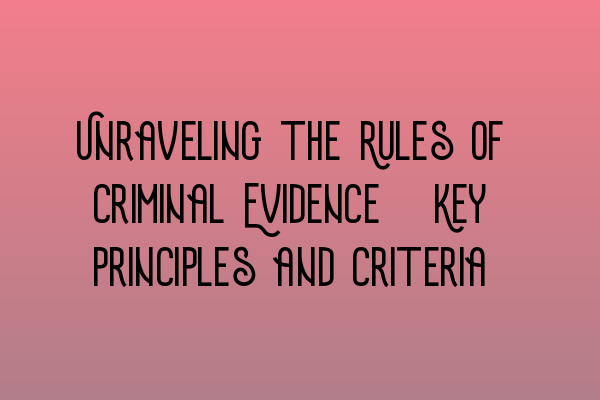Unraveling the Rules of Criminal Evidence: Key Principles and Criteria
As criminal law practitioners, it is crucial to have a clear understanding of the rules governing criminal evidence. The admissibility and weight of evidence play a fundamental role in determining the outcome of a criminal case. In this article, we will delve into the key principles and criteria that unravel the intricacies of criminal evidence, helping you navigate this complex area of law.
The Importance of Understanding Criminal Evidence
Before diving into the principles and criteria, let’s emphasize the significance of a comprehensive understanding of criminal evidence. Being well-versed in this subject matter is crucial for building a strong case, ensuring the protection of your clients’ rights, and upholding the principles of justice.
By being knowledgeable about criminal evidence, you can confidently navigate through contentious issues such as relevance, admissibility, hearsay, expert testimony, and more. Familiarity with these concepts will empower you to present a compelling argument to the court, ultimately influencing the final verdict.
Key Principles and Criteria of Criminal Evidence
1. Relevance: Relevance is a fundamental criterion for the admissibility of evidence. To be considered relevant, evidence must have a direct or indirect connection to the facts of the case. Courts typically apply a broad interpretation of relevance, allowing a wide range of evidence to be presented, as long as its connection to the case can be reasonably established.
2. Admissibility: Admissibility refers to the ability of evidence to be presented in court. For evidence to be admissible, it must meet various criteria, including being legally obtained, not violating any constitutional rights, and being properly preserved. Understanding the admissibility requirements is crucial to prevent the exclusion of valuable evidence that could strengthen your case.
3. Hearsay: Hearsay refers to statements made by a person who is not testifying in court, but is being presented through another person’s testimony. The general rule is that hearsay evidence is inadmissible unless it falls within certain exceptions. Familiarizing yourself with these exceptions is essential to effectively challenge or support hearsay evidence.
4. Expert Testimony: Expert testimony involves the presentation of evidence by qualified professionals who possess specialized knowledge or skills. Such testimony is admissible if the expert’s qualifications are established, their opinion is based on reliable methodologies, and the evidence is helpful to the trier of fact. Understanding the rules surrounding expert testimony will enable you to leverage this powerful tool in support of your case.
These are just a few of the key principles and criteria that govern criminal evidence. By gaining a deep understanding of these principles, you can ensure that you effectively advocate for your clients and navigate the complexities of the criminal justice system.
Expanding Your Expertise in Criminal Practice
To expand your expertise in criminal practice, consider attending workshops and seminars that focus on criminal law. These events provide invaluable opportunities to learn from experienced practitioners, engage in practical exercises, and network with like-minded professionals. Check out to discover upcoming events in your area.
Staying Informed and Prepared
Given the ever-evolving nature of criminal laws, it is crucial to stay informed and prepared. Regularly updating your knowledge on recent changes in legislation, landmark cases, and emerging trends is essential to ensure the best possible representation for your clients. Stay up-to-date with .
Enhancing Your SQE Criminal Law Study Group Experience
Studying criminal law in a group setting can be highly beneficial for enhancing your understanding and knowledge. Collaborating with fellow aspiring solicitors allows for a collective exchange of ideas, comprehensive discussions, and valuable insights. Explore effective techniques to enhance your study group experience in .
A Detailed Analysis of Criminal Evidence Rules
If you’re looking to delve even deeper into the rules and principles surrounding criminal evidence, check out . This comprehensive resource provides an in-depth exploration of this critical area of criminal law, equipping you with the knowledge to navigate evidentiary challenges with confidence.
Exploring Fraud and Financial Crimes in the UK
Fraud and financial crimes present unique challenges in the realm of criminal law. To gain a deeper understanding of this complex area, take a . This resource will equip you with the knowledge and insights to effectively handle cases involving financial wrongdoing.
In conclusion, understanding the principles and criteria that govern criminal evidence is essential for success in criminal law practice. By staying informed, enhancing your expertise through workshops and seminars, and accessing comprehensive resources, you can navigate the complexities of criminal evidence with confidence. Remember, the pursuit of justice starts with a solid foundation in criminal evidence.
